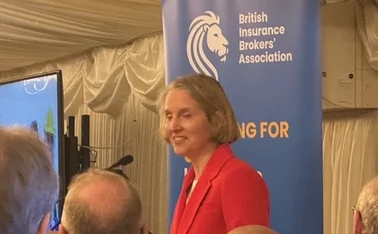
News analysis: Sexual harassment in spotlight as report shames Lloyd’s

Reports of misconduct at Lloyd’s have prompted questions over the prevalence of sexism in the wider insurance industry
Sexual harassment and sexism have dominated the headlines in recent months, with numerous reports of misconduct coming out of the Lloyd’s market.
A number of senior employees in the market have left following allegations of inappropriate behaviour (see box right), and the corporation has rushed through an action plan to combat sexism after a Bloomberg report accused it of having a “deep-seated culture of sexual harassment”.
For the most part reported cases have centred on men behaving inappropriately towards women.
The recent events at Lloyd’s have prompted questions of whether this problem is only prevalent in the City or if it is more widespread and a problem for brokers in the regions.
Melanie Hampton, managing director at Alexander Miller, did not believe that sexual harassment is a big issue in the regional broking sector, but she argued that the industry is still plagued by “inherent sexism”.
Hampton, who runs a broker with predominately women, said it is not an issue in her own company, but added that she is in contact with a number of young women who she has helped into the industry.
She stated: “One of them has already hit the glass ceiling, because so many teams are all men. At another broker they’re now taking on interns for six months to be able to say that they have got female brokers.”
Hampton noted that the insurance sector has a “blokey culture” and added that the industry is missing a trick.
Assault – one woman’s experience
A female broker has bravely told Insurance Age of her experiences of sexual harassment in the regional broking industry.
The woman, who declined to be named, recounted an incident at a Christmas party when she was in her early twenties and worked at a regional independent.
A man in a senior management position had cornered her, saying he wanted her to do well in the company, but she had to be willing to “do whatever he felt was necessary to further my career”.
She continued: “It was at this point his hand started to run up the inside of my thigh. I totally froze and didn’t know what to do – I didn’t want to make a scene because I didn’t want people to notice me. So it just happened – he put his fingers inside my underwear and told me that there was more where that came from if I wanted to progress.”
The broker explained that throughout her career she has experienced other male senior members of staff commenting on her looks and inviting her to meetings that involved overnight stays. “I would receive texts out of hours, comments about my sexual appetite and the odd wandering hand,” she continued.
“This is 2019, with broking firms dominated by the big players. How many of them would be comfortable releasing their figures on the gender balance of front end broking teams, let alone senior leadership roles?” she questioned.
Increased awareness
Meanwhile Paul Anscombe, chief executive of Seventeen Group, stated that the developments at Lloyd’s had increased awareness across the whole of the industry.
“My gut feeling is that there has always been a degree of sexism in the sector, mostly at the minor level, but you tend to hear about the more severe cases,” he added.
“Historically insurance broking has been a male-dominated industry, and it would be foolish to pretend that there have not been any incidents over the years in the broking profession.”
Former CEO and founder of Fresh Insurance, Lisa Powis, said she had never personally experienced sexism or harassment in the industry, and pointed out that it would never have been accepted at her company.
“It’s quite an old-fashioned industry, but I found the men I came in contact with charming and I never had any issues,” she stated.
In Powis’ view, the regional broking sector is a more modern environment than the London Market and women in the regions would not put up with harassment.
However, she accepted that sexism from men aimed at women was unlikely to occur in a female-run company and added: “I didn’t really come across it in the industry, but it’s possible I didn’t see it because of my position and what I was doing.”
Experts explained that the situation at Lloyd’s meant that it is now even more important for broking businesses to be seen to take these matters seriously and deal with any issues fairly and promptly.
They highlighted the importance of company culture when it comes to creating an environment where sexual harassment is not accepted.
Lloyd’s culture survey results
In the wake of the reports of sexual misconduct and harassment in the Lloyd’s market, the corporation launched a culture survey. The results showed that one in five respondents do not believe people have equal opportunities regardless of gender.
In addition, 8% had witnessed sexual harassment over the last 12 months, but only 45% said they would feel comfortable raising a concern. 22% of respondents had seen people in their organisation turn a blind eye to inappropriate behaviour.
Ahead of its publication, Lloyd’s CEO John Neal remarked that he was “devastated” by the findings.
In response to the survey results, Lloyd’s revealed a programme of measures intended to accelerate the pace of change. These include setting clear targets for improving the representation of women at senior levels and requiring every person and business operating in the market to act with integrity and speak up.
Lloyd’s will also appoint an independent advisory group comprised of experts with experience of successful cultural transformation.
A manager at Guy Carpenter recently lost his job after it was revealed that he had made an inappropriate joke involving a “glazed ring donut” about a female colleague in an all staff email.
This followed reports that two staff left Tokio Marine Kiln with one accused of groping and the other of stalking. In June Lloyd’s suspended an employee for making booze-fuelled inappropriate comments on a business trip.
Neal said: “I am determined that we create a working environment at Lloyd’s where everyone feels safe, valued and respected.
“Cultural change takes time, but we have to accelerate progress and the measures announced today are intended to do just that.”
The right culture
“If you allow the wrong culture to permeate and turn a blind eye to it you’re opening yourself up to big problems,” Anscombe stated.
The CEO further noted that he had not seen any major cases of sexual harassment within Seventeen Group, but explained that if it happened he would “tackle it head on”.
He continued: “We’ve been lucky so far, but we’re a growing business and with 260 staff now the risks are greater.
“We’re probably typical of most brokers, we haven’t had any major issues, but any minor issues that have come to our attention we’ve addressed at the time.”
Meanwhile, Steve White, chief executive of the British Insurance Brokers’ Association (Biba), told Insurance Age that not one member had contacted the trade body about sexual harassment or sexism-related issues.
He added: “Biba has signed the Inclusive Behaviours Pledge, primarily created for the London market and we recognise the importance of that issue.
“We’re quite active in the young broker space and I don’t have any young brokers saying they have issues around the culture where they are working.”
The stories coming out of Lloyd’s have made headlines in national media, and while insurance is only one of the industries hit by the #MeToo wave, brokers expressed concern that the publicity would damage the sector’s reputation.
Powis expected it to have a negative impact on the insurance industry as a whole. “I’m pleased they’re taking it seriously, because they need to. This shouldn’t be in any industry,” she concluded.
Only users who have a paid subscription or are part of a corporate subscription are able to print or copy content.
To access these options, along with all other subscription benefits, please contact info@insuranceage.co.uk.
You are currently unable to print this content. Please contact info@insuranceage.co.uk to find out more.
You are currently unable to copy this content. Please contact info@insuranceage.co.uk to find out more.
Copyright Infopro Digital Limited. All rights reserved.
As outlined in our terms and conditions, https://www.infopro-digital.com/terms-and-conditions/subscriptions/ (point 2.4), printing is limited to a single copy.
If you would like to purchase additional rights please email info@insuranceage.co.uk
Copyright Infopro Digital Limited. All rights reserved.
You may share this content using our article tools. As outlined in our terms and conditions, https://www.infopro-digital.com/terms-and-conditions/subscriptions/ (clause 2.4), an Authorised User may only make one copy of the materials for their own personal use. You must also comply with the restrictions in clause 2.5.
If you would like to purchase additional rights please email info@insuranceage.co.uk








